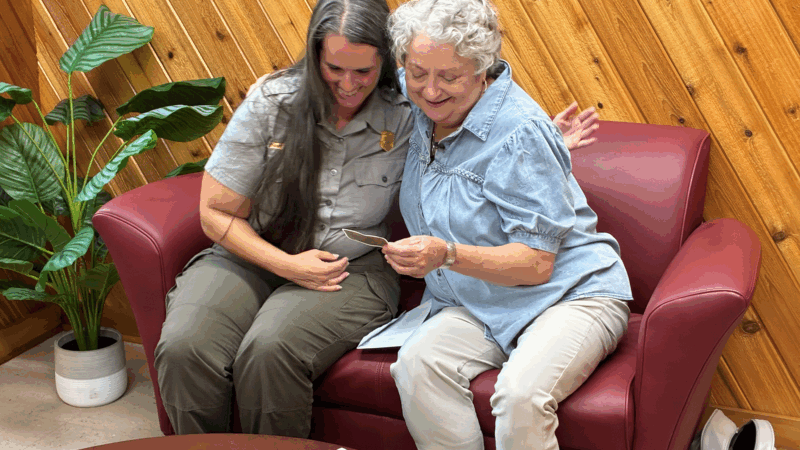ID lost to Hurricane Katrina is returned 20 years later
Twenty years after Hurricane Katrina decimated the coasts of Louisiana and Mississippi, few surprises continue to surface, but Becky Copeland has found one. She is a Wildlife Biologist and Park Ranger for the Gulf Islands National Seashore, a group of barrier islands off the coast of Mississippi and Florida, that are mostly uninhabited by humans, and part of the National Park Foundation.
It’s Copeland’s job to help take care of the islands and the creatures who live there. She spends much of her days scouring the sand, monitoring the nests of sea turtles and shorebirds. Two-and-a-half years ago, she was walking along the beach of Horn Island, looking for nests of Snowy Plovers, which lay their eggs in the white, sugar-colored sand.
About 25 yards from the water she saw it, just sitting in the sand: a piece of hard plastic.
She reached down to grab it, and it took a second for it to register that it wasn’t just a piece of trash. She says she could just make out the name on it: John Carroll High School, Birmingham, Alabama, 1969 -1970. “I can tell this is a student ID. I can see that there was once a photo right there.” But she can’t see the name or date of birth. She can see that it is over 50 years old, and 249 miles away from home.

In her five years on the job, Copeland has found other interesting items, particularly beautiful shells and a fair number of messages in bottles. Purposeful bits of humanity that people cast out in the world, hoping someone else will find them. These bits of found treasures mean something to her. They have stories.
“Nobody goes to Horn Island, nobody goes to the beach with their student ID from 50 years ago in their pocket and just happens to lose it on the beach,” she says. She knew it meant something to someone else, too. “If this still existed to this day, somebody was trying to keep it safe.”
So, she takes the ID home and puts it on a shelf with her other discoveries. And that’s where it sat until a couple of weeks ago when she was putting a new item on the shelf, and she noticed something odd had happened. The ID card had turned lighter in color, and the typeface she could not see before had darkened, making it now legible. “I just gasped. It was clear as day:” Catherine Hamel.
That’s when the detective inside her got busy.
She found a Facebook page for John Carroll High School in Birmingham, and in less than an hour, the owner was tracked down, and the mystery of how it got there was solved: Catherine Hamel had lost it in Hurricane Katrina.
Copeland had never even considered that. She grew up in Pennsylvania and was only 12 years old when Katrina hit. She vaguely remembers the news coverage about New Orleans, but says she didn’t even realize the impact it had on coastal Mississippi until she moved there five years ago.
The same cannot be said for Catherine Hamel. She was living in Bay Saint Louis, Miss., less than a block from the water when Katrina hit. She’ll be 70 next month, so it was just her and her then-husband living in their home. Their daughters had grown and moved out. Hamel says she had thought about riding out the storm at home when a last-minute report made her rethink that idea.

They decided to shelter with friends who lived a little farther inland. Growing up in Birmingham, Hamel had zero experience with the destructive power of a hurricane. She figured the worst that would happen was maybe some flooding. She moved her most prized possessions upstairs, and only took with her some insurance papers and two photo albums: one with pictures of her house, the other of her ancestors.
As the storm arrived, the water began creeping up the driveway where she and her friends were staying. Then it reached the house. Then into the house as it chased them upstairs. They were all in the attic, praying, when the water crested, hip-high.
When the water finally receded, and Hamel made it over to her house the day after, there was nothing left. Nothing but a concrete slab and her porch swing hanging in an oak tree. When she got closer, though, she found a ceramic statue of the Virgin Mary that her mother had given her, and it was lying in what had been her driveway, face up, staring at the blue sky. “Not a scratch, not a dent,” she says.

They found her piano, which she’d had since she was 6 years old, two houses down in a swimming pool. She spent months digging through the dirt trying to find something. Anything. Months later, she would find a tiny silver disc that had been on her grandmother’s charm bracelet. But her youngest daughter’s baby book? The family photo albums? High school yearbooks? Gone.
It would be nearly 20 years to the day before Hamel would get anything else back. But back it finally came.

“It was in a little metal box in the house so I’m assuming that little metal box had floated all the way out to Horn Island,” she says about her high school ID. “It was such a shock to wrap my head around. It’s been out there all that time.” It gives her chills to think about how that one little ID, freed at some point from the metal box, had spent nearly 20 years, floating around, bleached by the sun, blown by the wind, to finally land atop a little bit of sugar-white beach on Horn Island, about 55 miles east of her house. Just waiting to be found.
“Unless you go through it,” she starts to explain, before taking a breath and continuing, “People always kept saying, ‘Well, it’s just material stuff, and you can rebuild and you can do all that’ and yeah, I get it, but I lost everything that was a memento of the first 50 years of my life.” It was just swept away.
Like with a lot of people who lived through Katrina, this 20-year anniversary looms a little larger than Hamel would like. But the return of her high school identification card is one reminder of how far she has come. Katrina might have taken it, but the world and a park ranger named Becky Copeland gave it back.
In Berlin, there are movies, there’s politics and there’s talk about it all
Buzz around whether the city's film festival would take a stance on the war in Gaza has dominated conversation in recent days.
Alex Ferreira wins 10th gold medal for Team USA, matching America’s highest total in Winter Olympics
Freeskier Alex Ferreira clinches a tenth gold medal for the U.S. in these Games, tying the U.S.'s all-time record for gold medals in a Winter Olympics.
Trump calls SCOTUS tariffs decision ‘deeply disappointing’ and lays out path forward
President Trump claimed the justices opposing his position were acting because of partisanship, though three of those ruling against his tariffs were appointed by Republican presidents.
The U.S. men’s hockey team to face Slovakia for a spot in an Olympic gold medal match
After an overtime nailbiter in the quarterfinals, the Americans return to the ice Friday in Milan to face the upstart Slovakia for a chance to play Canada in Sunday's Olympic gold medal game.
NASA eyes March 6 to launch 4 astronauts to the moon on Artemis II mission
The four astronauts heading to the moon for the lunar fly-by are the first humans to venture there since 1972. The ten-day mission will travel more than 600,000 miles.
Skis? Check. Poles? Check. Knitting needles? Naturally
A number of Olympic athletes have turned to knitting during the heat of the Games, including Ben Ogden, who this week became the most decorated American male Olympic cross-country skier.








